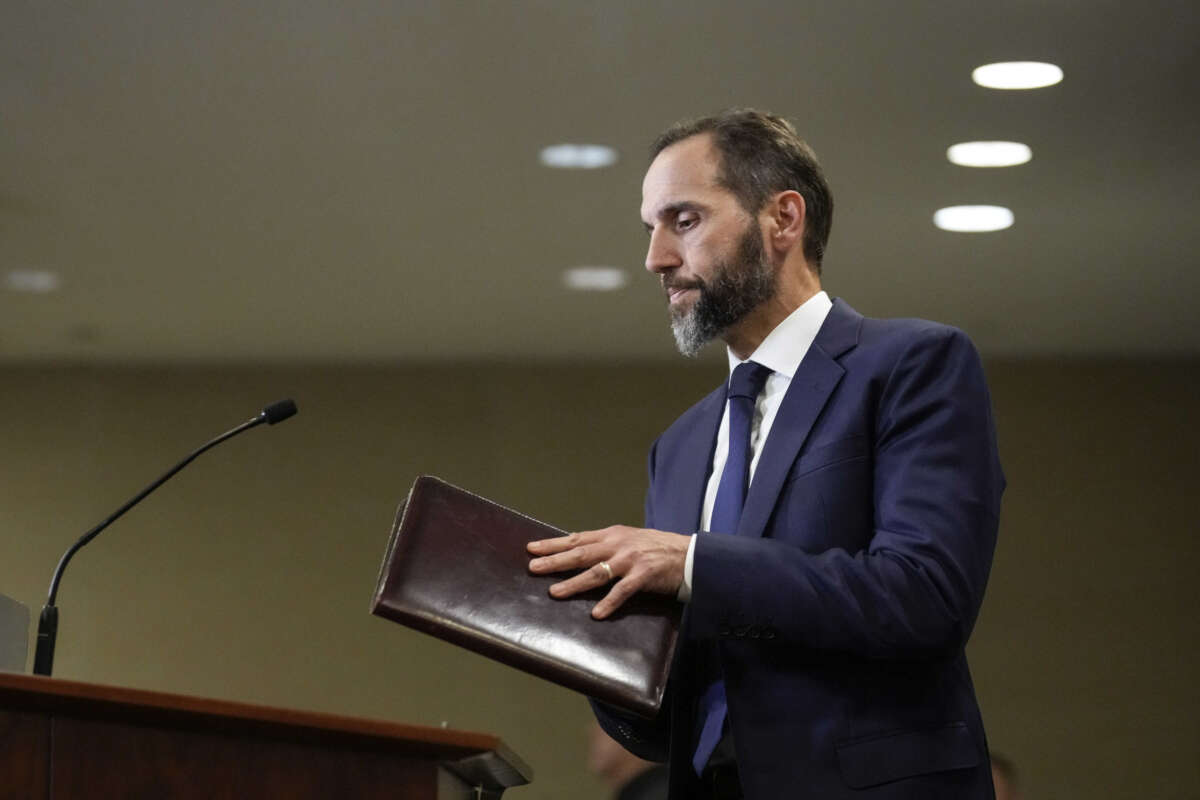Support justice-driven, accurate and transparent news — make a quick donation to Truthout today!
Special counsel Jack Smith’s office, running within but independent of the Department of Justice (DOJ), is winding down its work relating to the federal criminal charges against former President Donald Trump, in light of Trump’s win in the 2024 election.
Several sources have confirmed to multiple news agencies that talks about how to dismantle the office’s work have started. The wind-down complies with a longstanding DOJ policy that sitting presidents cannot be prosecuted by the department.
Former federal prosecutor and NBC News contributor Chuck Rosenberg said the move was logical but disappointing.
“Sensible, inevitable and unfortunate,” Rosenberg said.
Smith’s office charged Trump in two separate cases. In one, Smith accused Trump of illegally removing thousands of government documents, including hundreds of classified materials, from the White House when he left office in 2021, hoarding dozens of boxes of documents at unsecured locations in his Mar-a-Lago estate in Palm Beach, Florida. Although Trump-appointed federal Judge Aileen Cannon dubiously dismissed all charges against the former president, Smith was planning to appeal that decision.
In the other case, Smith indicted Trump on four charges relating to his involvement in the January 6, 2021, attack on the U.S. Capitol. Those charges included conspiracy to defraud the United States, conspiracy to obstruct an official proceeding, obstruction of/attempt to obstruct an official proceeding, and conspiracy against rights.
Both cases had seen multiple delay attempts, some successful, from Trump’s legal team, including demands for review by the Supreme Court over questionable claims of presidential immunity, which the conservative court granted, in part, earlier this year.
Smith has not spoken publicly about Trump’s charges since the presidential election was called earlier this week.
With delays likely to have continued into next year, it’s clear that, now as president-elect, Trump will make moves to have the charges against him dismissed entirely if Smith doesn’t wrap up the case on his own. Indeed, in an interview last month with a conservative radio host, Trump indicated that, if he won the presidential election, he would remove Smith from his special counsel position.
“I would fire him within two seconds,” Trump said.
State-based criminal charges against Trump also appear to be doomed. Although there isn’t legal precedent regarding how a sitting president should be treated in state criminal proceedings, it’s likely that both the New York- and Georgia-based cases would eventually be taken to the Supreme Court, in which case there would be a high probability that a majority of the justices would rule that Trump cannot be prosecuted until after his term expires.
Presidents, under previous Supreme Court precedent, can be held liable under civil suits, and Trump may have to pay out large judgments, including tens of millions of dollars to journalist E. Jean Carroll, who he was found liable for sexually abusing.
But when he returns to office, Trump will almost certainly continue his practice of using the presidency as a means to earn income for his private properties, which will help him fund any payments he’s found liable to make. Indeed, a congressional report from Democrats last month found that Trump had used his properties to receive payments from foreign dignitaries, a possible violation of the Emoluments clause of the U.S. Constitution, and that he has overcharged for Secret Service protection by as much as 300 percent above standard costs when he’s traveled to his hotels or golf clubs.
Some legal experts suggested that Smith’s decision to wind down his work is advantageous to his overall goal, as it will allow him to submit a final report about his findings to current Attorney General Merrick Garland.
“Jack Smith ‘winding down’ the investigation means he writes a final report to Garland, who has the option to make it public. If Smith waits until he is fired, those reports never see the light of day, and he knows this,” former FBI agent and lawyer Asha Rangappa said on X.
Such a report could be cited in cases against Trump when he leaves office if the DOJ were to pursue the same charges, or if new charges arise regarding actions taken during his second term.
Press freedom is under attack
As Trump cracks down on political speech, independent media is increasingly necessary.
Truthout produces reporting you won’t see in the mainstream: journalism from the frontlines of global conflict, interviews with grassroots movement leaders, high-quality legal analysis and more.
Our work is possible thanks to reader support. Help Truthout catalyze change and social justice — make a tax-deductible monthly or one-time donation today.
